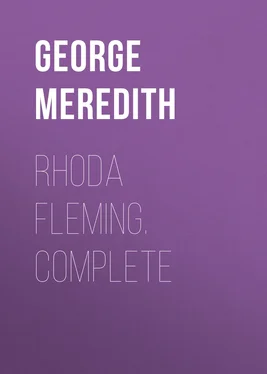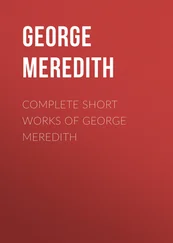George Meredith - Rhoda Fleming. Complete
Здесь есть возможность читать онлайн «George Meredith - Rhoda Fleming. Complete» — ознакомительный отрывок электронной книги совершенно бесплатно, а после прочтения отрывка купить полную версию. В некоторых случаях можно слушать аудио, скачать через торрент в формате fb2 и присутствует краткое содержание. Жанр: foreign_prose, literature_19, foreign_antique, на английском языке. Описание произведения, (предисловие) а так же отзывы посетителей доступны на портале библиотеки ЛибКат.
- Название:Rhoda Fleming. Complete
- Автор:
- Жанр:
- Год:неизвестен
- ISBN:нет данных
- Рейтинг книги:3 / 5. Голосов: 1
-
Избранное:Добавить в избранное
- Отзывы:
-
Ваша оценка:
- 60
- 1
- 2
- 3
- 4
- 5
Rhoda Fleming. Complete: краткое содержание, описание и аннотация
Предлагаем к чтению аннотацию, описание, краткое содержание или предисловие (зависит от того, что написал сам автор книги «Rhoda Fleming. Complete»). Если вы не нашли необходимую информацию о книге — напишите в комментариях, мы постараемся отыскать её.
Rhoda Fleming. Complete — читать онлайн ознакомительный отрывок
Ниже представлен текст книги, разбитый по страницам. Система сохранения места последней прочитанной страницы, позволяет с удобством читать онлайн бесплатно книгу «Rhoda Fleming. Complete», без необходимости каждый раз заново искать на чём Вы остановились. Поставьте закладку, и сможете в любой момент перейти на страницу, на которой закончили чтение.
Интервал:
Закладка:
“It’ll never be much,” sighed Anthony.
“Well, the world’s nothing, if you come to look at it close,” the farmer adopted a similar tone.
“What’s money!” said Anthony.
The farmer immediately resumed his this-worldliness:
“Well, it’s fine to go about asking us poor devils to answer ye that,” he said, and chuckled, conceiving that he had nailed Anthony down to a partial confession of his ownership of some worldly goods.
“What do you call having money?” observed the latter, clearly in the trap. “Fifty thousand?”
“Whew!” went the farmer, as at a big draught of powerful stuff.
“Ten thousand?”
Mr. Fleming took this second gulp almost contemptuously, but still kindly.
“Come,” quoth Anthony, “ten thousand’s not so mean, you know. You’re a gentleman on ten thousand. So, on five. I’ll tell ye, many a gentleman’d be glad to own it. Lor’ bless you! But, you know nothing of the world, brother William John. Some of ‘em haven’t one—ain’t so rich as you!”
“Or you, brother Tony?” The farmer made a grasp at his will-o’-the-wisp.
“Oh! me!” Anthony sniggered. “I’m a scraper of odds and ends. I pick up things in the gutter. Mind you, those Jews ain’t such fools, though a curse is on ‘em, to wander forth. They know the meaning of the multiplication table. They can turn fractions into whole numbers. No; I’m not to be compared to gentlemen. My property’s my respectability. I said that at the beginning, and I say it now. But, I’ll tell you what, brother William John, it’s an emotion when you’ve got bags of thousands of pounds in your arms.”
Ordinarily, the farmer was a sensible man, as straight on the level of dull intelligence as other men; but so credulous was he in regard to the riches possessed by his wife’s brother, that a very little tempted him to childish exaggeration of the probable amount. Now that Anthony himself furnished the incitement, he was quite lifted from the earth. He had, besides, taken more of the strong mixture than he was ever accustomed to take in the middle of the day; and as it seemed to him that Anthony was really about to be seduced into a particular statement of the extent of the property which formed his respectability (as Anthony had chosen to put it), he got up a little game in his head by guessing how much the amount might positively be, so that he could subsequently compare his shrewd reckoning with the avowed fact. He tamed his wild ideas as much as possible; thought over what his wife used to say of Anthony’s saving ways from boyhood, thought of the dark hints of the Funds, of many bold strokes for money made by sagacious persons; of Anthony’s close style of living, and of the lives of celebrated misers; this done, he resolved to make a sure guess, and therefore aimed below the mark.
Money, when the imagination deals with it thus, has no substantial relation to mortal affairs. It is a tricksy thing, distending and contracting as it dances in the mind, like sunlight on the ceiling cast from a morning tea-cup, if a forced simile will aid the conception. The farmer struck on thirty thousand and some odd hundred pounds—outlying debts, or so, excluded—as what Anthony’s will, in all likelihood, would be sworn under: say, thirty thousand, or, safer, say, twenty thousand. Bequeathed—how? To him and to his children. But to the children in reversion after his decease? Or how? In any case, they might make capital marriages; and the farm estate should go to whichever of the two young husbands he liked the best. Farmer Fleming asked not for any life of ease and splendour, though thirty thousand pounds was a fortune; or even twenty thousand. Noblemen have stooped to marry heiresses owning no more than that! The idea of their having done so actually shot across him, and his heart sent up a warm spring of tenderness toward the patient, good, grubbing old fellow, sitting beside him, who had lived and died to enrich and elevate the family. At the same time, he could not refrain from thinking that Anthony, broad-shouldered as he was, though bent, sound on his legs, and well-coloured for a Londoner, would be accepted by any Life Insurance office, at a moderate rate, considering his age. The farmer thought of his own health, and it was with a pang that he fancied himself being probed by the civil-speaking Life Insurance doctor (a gentleman who seems to issue upon us applicants from out the muffled folding doors of Hades; taps us on the chest, once, twice, and forthwith writes down our fateful dates). Probably, Anthony would not have to pay a higher rate of interest than he.
“Are you insured, brother Tony?” the question escaped him.
“No, I ain’t, brother William John;” Anthony went on nodding like an automaton set in motion. “There’s two sides to that. I’m a long-lived man. Long-lived men don’t insure; that is, unless they’re fools. That’s how the Offices thrive.”
“Case of accident?” the farmer suggested.
“Oh! nothing happens to me,” replied Anthony.
The farmer jumped on his legs, and yawned.
“Shall we take a turn in the garden, brother Tony?”
“With all my heart, brother William John.”
The farmer had conscience to be ashamed of the fit of irritable vexation which had seized on him; and it was not till Anthony being asked the date of his birth, had declared himself twelve years his senior, that the farmer felt his speculations to be justified. Anthony was nearly a generation ahead. They walked about, and were seen from the windows touching one another on the shoulder in a brotherly way. When they came back to the women, and tea, the farmer’s mind was cooler, and all his reckonings had gone to mist. He was dejected over his tea.
“What is the matter, father?” said Rhoda.
“I’ll tell you, my dear,” Anthony replied for him. “He’s envying me some one I want to ask me that question when I’m at my tea in London.”
CHAPTER IV
Mr. Fleming kept his forehead from his daughter’s good-night kiss until the room was cleared, after supper, and then embracing her very heartily, he informed her that her uncle had offered to pay her expenses on a visit to London, by which he contrived to hint that a golden path had opened to his girl, and at the same time entreated her to think nothing of it; to dismiss all expectations and dreams of impossible sums from her mind, and simply to endeavour to please her uncle, who had a right to his own, and a right to do what he liked with his own, though it were forty, fifty times as much as he possessed—and what that might amount to no one knew. In fact, as is the way with many experienced persons, in his attempt to give advice to another, he was very impressive in lecturing himself, and warned that other not to succumb to a temptation principally by indicating the natural basis of the allurement. Happily for young and for old, the intense insight of the young has much to distract or soften it. Rhoda thanked her father, and chose to think that she had listened to good and wise things.
“Your sister,” he said—“but we won’t speak of her. If I could part with you, my lass, I’d rather she was the one to come back.”
“Dahlia would be killed by our quiet life now,” said Rhoda.
“Ay,” the farmer mused. “If she’d got to pay six men every Saturday night, she wouldn’t complain o’ the quiet. But, there—you neither of you ever took to farming or to housekeeping; but any gentleman might be proud to have one of you for a wife. I said so when you was girls. And if, you’ve been dull, my dear, what’s the good o’ society? Tea-cakes mayn’t seem to cost money, nor a glass o’ grog to neighbours; but once open the door to that sort o’ thing and your reckoning goes. And what I said to your poor mother’s true. I said: Our girls, they’re mayhap not equals of the Hollands, the Nashaws, the Perrets, and the others about here—no; they’re not equals, because the others are not equals o’ them, maybe.”
Читать дальшеИнтервал:
Закладка:
Похожие книги на «Rhoda Fleming. Complete»
Представляем Вашему вниманию похожие книги на «Rhoda Fleming. Complete» списком для выбора. Мы отобрали схожую по названию и смыслу литературу в надежде предоставить читателям больше вариантов отыскать новые, интересные, ещё непрочитанные произведения.
Обсуждение, отзывы о книге «Rhoda Fleming. Complete» и просто собственные мнения читателей. Оставьте ваши комментарии, напишите, что Вы думаете о произведении, его смысле или главных героях. Укажите что конкретно понравилось, а что нет, и почему Вы так считаете.












